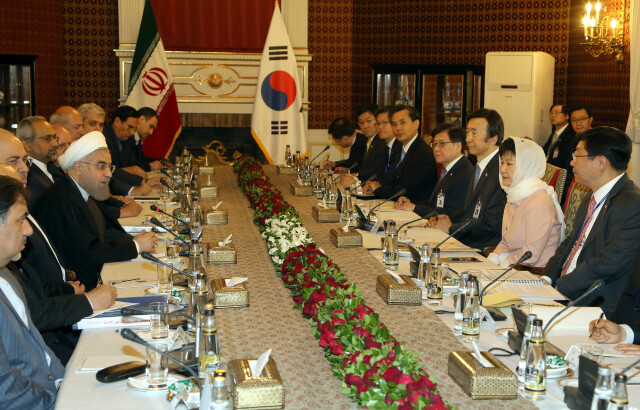hankyoreh
Links to other country sites 다른 나라 사이트 링크
[Analysis] Park’s summit in Iran yields no specific action on North Korean nukes

The message about the North Korean nuclear issue delivered by South Korean President Park Geun-hye and Iranian President Hassan Rouhani following their summit in Tehran, Iran on May 2 was abstract, theoretical and symbolic. The message did not contain any points of agreement about the North Korean nuclear issue, nor did it list any specific kinds of joint action that the two countries would take in response to North Korea’s nuclear program.
This is attributed to the passive stance of Iran, which has long been a close ally of North Korea in a number of areas, including military cooperation.
However, the Iranian government has publicly denied military cooperation with North Korea, including on missiles. On Apr. 21, Hassan Teherian, Iran‘s ambassador to South Korea, said, “We are certainly not cooperating with North Korea in the area of missiles.”
“We want peace on the Korean Peninsula. We are opposed in principle to any nuclear development,” Rouhani said during the joint press conference after his summit with Park.
“Our fundamental position is the elimination of nuclear weapons, which are dangerous whether on the Korean Peninsula or in the Middle East,” he said.
Rouhani’s remarks have some significance in the sense that they represent the Iranian government‘s public support for the principle of denuclearizing the Korean Peninsula.
However, it is noteworthy that his comments went no further than expressing a theoretical commitment to peace, denuclearization and nuclear disarmament without specifying North Korea.
It can be presumed that Iran does not intend to actively pressure North Korea, despite showing a courteous welcome to Park for traveling all the way to Tehran. This response is likely to disappoint the Park administration, which had hoped that this summit could be used to persuade Iran to deliver a significant message about North Korea’s nuclear program.
Evidence that Iran sought to avoid committing to any concrete cooperation with the South Korean government‘s response to the North Korean nuclear issue can also be confirmed at various points in Park’s remarks.
“I emphasized that the key to lasting peace and stability on the Korean Peninsula and in Northeast Asia lies in the peaceful unification of the Korean Peninsula, and Rouhani expressed Iran’s support for the South Korean people’s desire for peaceful unification of the Korean Peninsula,” Park said during the joint press conference.
“I explained the South Korean government’s position that North Korea’s nuclear weapons cannot be tolerated and its support for denuclearizing North Korea. I also emphasized the importance of faithfully implementing UN Security Council Resolution No. 2270, which was recently adopted in response to a North Korean nuclear test, and asked Rouhani for Iran‘s cooperation.”
During Park’s comments in the joint press conference, the only specific response she said Rouhani had made to her explanation of South Korea’s efforts to curb North Korea’s nuclear program and her request for cooperation was Rouhani’s expression of “support for the South Korean people’s desire for peaceful unification.”
Park did not say how Rouhani had reacted to her description of the South Korean government‘s opposition to North Korea’s nuclear program and its support for denuclearizing North Korea or to her request for faithful implementation of UN Security Council Resolution No. 2270 and for cooperation. This suggests that the two leaders were not in agreement on these points.
By Lee Je-hun, staff reporter in Tehran and Choi Hye-jung, staff reporter
Please direct questions or comments to [english@hani.co.kr]

Editorial・opinion
![[Column] Park Geun-hye déjà vu in Yoon Suk-yeol [Column] Park Geun-hye déjà vu in Yoon Suk-yeol](https://flexible.img.hani.co.kr/flexible/normal/500/300/imgdb/original/2024/0424/651713945113788.jpg) [Column] Park Geun-hye déjà vu in Yoon Suk-yeol
[Column] Park Geun-hye déjà vu in Yoon Suk-yeol![[Editorial] New weight of N. Korea’s nuclear threats makes dialogue all the more urgent [Editorial] New weight of N. Korea’s nuclear threats makes dialogue all the more urgent](https://flexible.img.hani.co.kr/flexible/normal/500/300/imgdb/original/2024/0424/7317139454662664.jpg) [Editorial] New weight of N. Korea’s nuclear threats makes dialogue all the more urgent
[Editorial] New weight of N. Korea’s nuclear threats makes dialogue all the more urgent- [Guest essay] The real reason Korea’s new right wants to dub Rhee a founding father
- [Column] ‘Choson’: Is it time we start referring to N. Korea in its own terms?
- [Editorial] Japan’s rewriting of history with Korea has gone too far
- [Column] The president’s questionable capacity for dialogue
- [Column] Are chaebol firms just pizza pies for families to divvy up as they please?
- [Column] Has Korea, too, crossed the Rubicon on China?
- [Correspondent’s column] In Japan’s alliance with US, echoes of its past alliances with UK
- [Editorial] Does Yoon think the Korean public is wrong?
Most viewed articles
- 1‘We must say no’: Seoul defense chief on Korean, USFK involvement in hypothetical Taiwan crisis
- 2N. Korean delegation’s trip to Iran shows how Pyongyang is leveraging ties with Moscow
- 3[Column] Park Geun-hye déjà vu in Yoon Suk-yeol
- 4Amnesty notes ‘erosion’ of freedom of expression in Korea in annual human rights report
- 5‘Weddingflation’ breaks the bank for Korean couples-to-be
- 646% of cases of violence against women in Korea perpetrated by intimate partner, study finds
- 7[Reportage] On US campuses, student risk arrest as they call for divestment from Israel
- 8“Parental care contracts” increasingly common in South Korea
- 9[Interview] Dear Korean men, It’s OK to admit you’re not always strong
- 10Korean government’s compromise plan for medical reform swiftly rejected by doctors